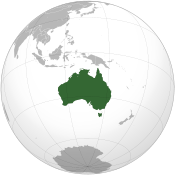Australian PM announces nuclear taskforce
Wednesday, June 7, 2006
| Wikinews Australia has in-depth coverage of this issue: Australian nuclear debate |
As expected by media sources, Australian Prime Minister, John Howard announced on Tuesday that he would be setting up a "Prime Ministerial taskforce" to investigate uranium mining, processing and nuclear energy in Australia.
Timeframe and purpose
The results of the review to be undertaken by the taskforce are expected to be made public in November. The taskforce is to investigate:
- Whether Australia has the capacity to increase uranium mining,
- Whether it would be economical for Australia to carry out uranium enrichment and reprocessing,
- Implications a nuclear energy industry would have on Australia's existing energy industries,
- The circumstances under which nuclear energy could become economically viable,
- How nuclear energy could decrease greenhouse gas emissions,
- How nuclear energy could work alongside renewable energy sources,
- "Next generation" nuclear technologies, which claim to resolve safety, waste and proliferation concerns,
- Nuclear waste and storage,
- Possible security implications,
- Health and safety issues.
The taskforce
Mr Howard said the taskforce will be led by former Telstra CEO and nuclear physicist, Dr Ziggy Switkowski and will include five other members. In a statement, Mr Howard announced two of the five additional members. One of Australia's foremost nuclear researchers, Professor George Dracoulis from the Australian National University and economist Professor Warwick McKibbin, a board member of the Reserve Bank of Australia.
The Prime Minister said that he would announce the other three members today, after they confirm their availability.
Dr. Jim Peacock, Australia’s Chief Scientist, will assist the review process.
Mr Howard said that Australia should investigate the potential to capitalise on its vast uranium reserves. He said Australia had 40 percent of the world's known uranium reserves, and Australia could "increase and add value to our uranium extraction and exports".
The Prime Minister told reporters that nuclear energy is not something that will happen in the short term in Australia, but may occur in the long term. "I don’t expect to have nuclear power stations in Australia within the next two or three years," he said.
"I do think, however, that we need in an open-minded and as emotionless fashion possible, to have a serious debate about this issue." Mr Howard said.
Mr Howard said that it is "foolish" for Australia to remain solely as an exporter of uranium given the vast amounts of the mineral the country has.
The opposition has been calling on the Howard government to name possible locations for nuclear power stations since announcing that they wish to investigate the use of nuclear energy. Mr Howard told reporters that it the plants would be built by private enterprise and those calls on the government were "putting the cart before the horse".
Mr Howard said that his government expected the opposition to run a "fear campaign" on the issue and that he would not be deterred, as he believes the public's opinion on nuclear energy has shifted significantly. He said that he wanted a full and open review, examination and debate.
Criticism
During his press conference on Tuesday, Mr Howard was asked if the taskforce had been weighted to come up with a favourable report as the members announced so far were pro-nuclear. Mr Howard denied the claim saying that members had been selected who knew the subject and were "open-minded and clear headed".
Claims of a conflict of interest with Ziggy Switkowski have begun to surface after it was revealed that he is a board member of the Australian Nuclear Science and Technology Organisation, which runs Australia's only nuclear reactors in Lucas Heights, south of Sydney. Mr Howard, speaking on ABC Television defended the claims saying "He's a nuclear physicist Ziggy Switkowski, he's a proven person in the commercial area, he's got strong public administration skills, that's a good combination for something like this".
In order to minimise the conflict of interest, Switkowski resigned from the board of ANSTO on June 7 2006.
Sources
- Press Release. "Review Uranium mining, processing and nuclear energy in Australia" — The Prime Minister of Australia, June 6, 2006
- Transcript. "Press Conference on the Review of uranium and nuclear energy in Australia; civil unions; GST; Telstra" — The Prime Minister of Australia, June 6, 2006
- "Nuclear review chief quits ANSTO board" — Australian Broadcasting Corporation, June 8, 2006
| |
This page has been automatically archived by a robot, and is no longer publicly editable.
Got a correction? Add the template {{editprotected}} to the talk page along with your corrections, and it will be brought to the attention of the administrators. Please note that the listed sources may no longer be available online. |





